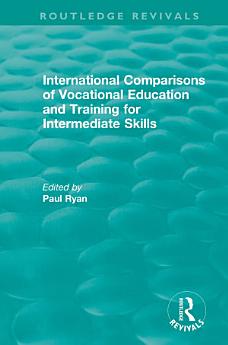International Comparisons of Vocational Education and Training for Intermediate Skills
About this ebook
The introduction outlines the strengths and weaknesses of comparative research. Part 1 discusses the use which has been made of it by policy makers in Britain and various aspects of comparative methods in practical comparisons, including an Anglo-Scottish one. Part 2 concerns vocational preparation in connection with productivity and produce markets, noting its importance for economic performance and its dependence upon companies’ product choices. Part 3 contains studies of the organization of skills and work and the finance of training within the EEC as a whole. Part 4 comprises studies of training in relation to labour market structures, each of which indicates similar alternatives for training policy in Britain – alternatives whose relevance and political prospects can only be enhanced by the demise of Thatcher government deregulatory policies.








